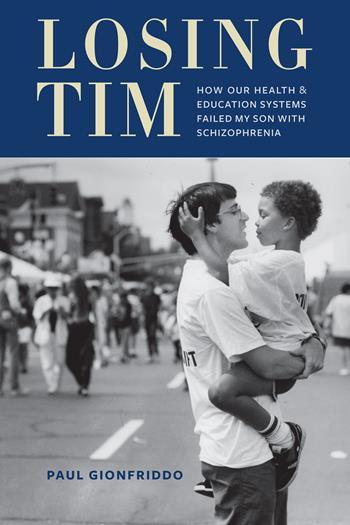Preface to Losing Tim: How Our Health and Education Systems Failed My Son with Schizophrenia
“But I think [Tim] understood that if his story could help change the way we think and move us to action, it was worth telling. Plus, he loves me, and I love him.”—Paul Gionfriddo
We conclude our week-long feature on Losing Tim: How Our Health and Education Systems Failed My Son with Schizophrenia, with an excerpt from the book’s preface in which Paul Gionfriddo discusses why he decided to write about his son. For more of the book you can also read the book’s first chapter, Tim Brings a Gun to School.
When my son Tim was a very young boy, he knew that I was an elected official, and he understood that elected officials made many of the “rules” by which people live. “My dad is important,” he used to volunteer to people when we were introduced to them. The problem was that he pronounced the word as “impotent,” which typically elicited a giggle that puzzled Tim. Giggles aside, he had no idea how apt a description that would become when it came to my helping to make his own life more tolerable.
This book is in part a reflection on public policy and the way public policy decisions I made in good faith affected Tim’s life….
As i imagine is the case for most parents of children with serious chronic illnesses, in the course of over two decades I amassed hundreds of hard-copy and electronic documents relating to tim. they traveled with me from Connecticut to Texas and then to Florida. I saved all that I could, although there were plenty of times I wanted to burn the whole pile of paper or smash the computer in frustration. but after twenty years of storing them I decided it was time to make sense of them. So I began to do what I had been wanting to do for a long time— piece them into a narrative. I had no idea what the ending would be. I just wanted to understand better what had happened to Tim and me as we traveled his path of serious mental illness.
This book is the result. At first, it was all about Tim and not at all about me. But then i realized that I needed to describe better how iI felt about what was happening to Tim. When I started to do this, it dawned on me that I also needed to write more about the role I played as a policy maker in determining what happened to him….
Tim did something i found to be very courageous. He graciously gave his permission in writing for his story to be told. when he did so, I don’t think that he admired policy makers as he once had or had much respect for the rules they’ve created that affected him most directly. But I think he understood that if his story could help change the way we think and move us to action, it was worth telling. Plus, he loves me, and I love him.
As it unfolds, this story may sometimes seem strange or surreal to parents whose children do not have a mental illness. I admit, some of the things that happened to us may be pretty hard to believe. But they won’t be to parents of children who do have mental illness.
Part of the reason is that we don’t usually get clean diagnoses from the start that we can then carry with us to schools or providers. Parents of children with physical disabilities, developmental delays, or genetic conditions often know where they stand. there are accepted treatments and services to mitigate the effects, and they can start treating those effects right away. our kids’ diagnoses often evolve over time, and it can be years before we get to the right one. That means years of uncertainty, years of the wrong drugs, and years of treatment that doesn’t work.
Even our introduction to, and experience with, the special education system will seem unusual to many parents who are familiar with it. Special education opens doors to instructional programs tailored to an eligible student’s individual needs for educational success. many children (like my daughter Larissa) enter the special education system with a clear label, and that allows for the creation of a program with a clear set of instructional goals, objectives, modifications, and accommodations. The process is smooth, and these children thrive. But when the label isn’t so clear, neither is the plan. And children with mental illness typically don’t enter special education with a clear label. When a child is challenging behaviorally—and this is all you really can say—what is a school to do? And so when Tim first entered the special education system—probably already three years into his disease—it was with a “learning disability” label.
A reader may also wonder why Tim was in a regular classroom in a regular school when the story in the first chapter unfolds, months after his diagnosis of mental illness. Under the law, educational services are supposed to be provided in the “least restrictive settings.” For nearly every child in special education today, that means instruction in a regular classroom first and the consideration of increasingly more restrictive settings only later. I had no quarrel when that standard was applied to Tim by our school district; in fact, I wholeheartedly agreed with it. besides, Tim was legally entitled to it.
Finally, there is some chaos in the story to come, but chaos is an accepted part of life for every family dealing with a member’s mental illness. Tim was raised by loving parents and, later, step-parents, around three siblings and later one step-sibling. We were no different from any other family in trying to balance Tim’s needs with the needs of these siblings. Tim’s mother and I ultimately agreed on nearly every decision we made on behalf of Tim. Not all parents do. undoubtedly, we will be criticized by readers for some of them. But we made them in good faith at the time, on the basis of all we knew in the moment. We did not have the perspective then that anyone may have now. And criticizing anyone for circumstances outside of their control is really a dead end. In any event, I believe that this is a story that needs to be retold. and, i hope, it is a story to which all parents will ultimately relate at some level—one that reminds us how public policies also have consequences.




